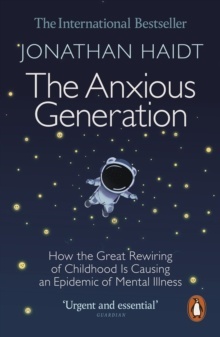The Anxious Generation

Editorial Penguin
Fecha de edición enero 2025 · Edición nº 1
Idioma inglés
EAN 9781802063271
Libro
encuadernado en tapa blanda
Resumen del libro
After more than a decade of stability or improvement, the mental health of adolescents in many countries around the world deteriorated suddenly in the early 2010s. Why have rates of depression, anxiety, self-harm and suicide risen so sharply, more than doubling in many cases?In this book, Social Psychologist Jonathan Haidt argues that the decline of free-play in childhood and the rise of smartphone usage among adolescents are the twin sources of increased mental distress among teenagers.Haidt delves into the latest psychological and biological research to show how, between 2010 and 2015, childhood and adolescence got rewired. As teens traded in their flip phones for smartphones packed with social media apps, time online soared while time engaging face-to-face with friends and family plummeted, and so did mental health. This profound shift took place against a backdrop of diminishing childhood freedom, as parents over-supervised every aspect of their children's lives offline, depriving them of the experiences they most need to become strong and self-governing adults.The Anxious Generation reveals the fundamental ways in which this shift from free-play to smartphones disrupts development from sleep deprivation to addiction with separate in-depth analyses of the impact on girls and boys. Grounded in ancient wisdom and packed full of cutting-edge science, this eye-opening book is a life raft and a powerful call-to-arms, offering practical advice for parents, schools, governments, and teens themselves.
Biografía del autor
Jonathan Haidt es psicólogo social y profesor de liderazgo ético en la Escuela de Negocios Stern de la Universidad de Nueva York. Su investigación se centra en la psicología de la moralidad y en las emociones morales complejas.<br> Como docente, aplica sus estudios a la ética empresarial, analizando cómo las empresas pueden constituirse y funcionar de forma que resistan a los dilemas éticos. Asimismo, colabora en el desarrollo de numerosos proyectos, entre ellos la Heterodox Academy, una asociación que reúne a más de 2.300 profesores cuyo objetivo es aumentar la diversidad de puntos de vista en las universidades.<br> En 2012, la revista Foreign Policy le consideró uno de los 100 pensadores globales más importantes y la revista Prospect uno de los 65 pensadores del mundo . Es autor de numerosos artículos académicos y de los libros La hipótesis de la felicidad (Gedisa, 2006), La mente de los justos (Deusto, 2019) y La transformación de la mente moderna, escrito junto con Greg Lukianoff (Deusto, 2019).








